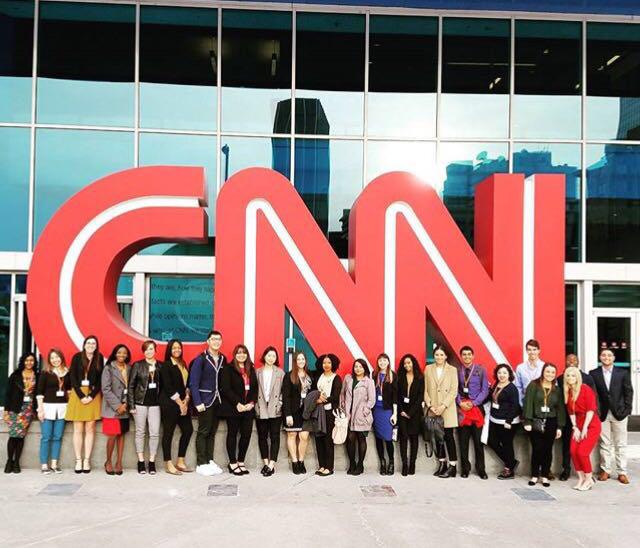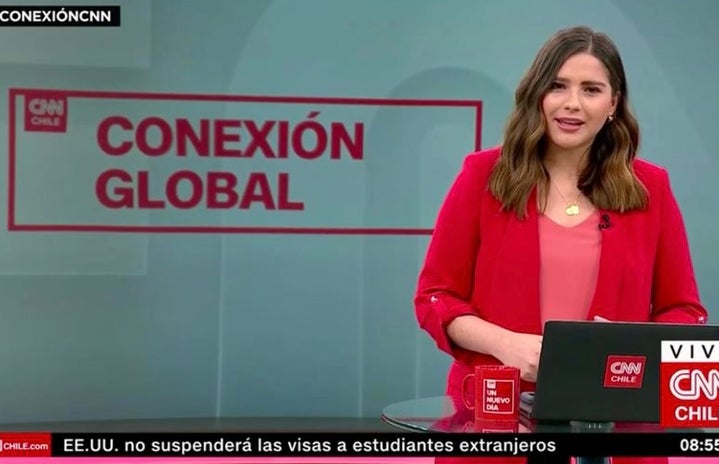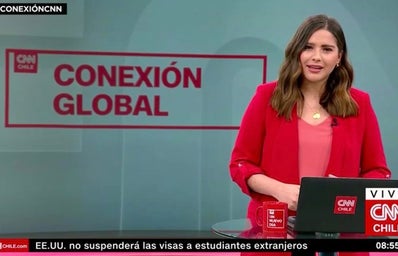Elisa Hernandez as a CNN Chile news anchor. (Image provided by Eliza Hernandez).
During my time in Barcelona, I met Elisa Hernandez, a former CNN television journalist from Santiago, Chile. After studying for five years and receiving a bachelor’s in journalism, she started working for CNN Chile—first as a journalist, then as a news anchor. Elisa quit her job before taking a year off to focus on her mental health and going to Barcelona to explore new career interests. Given her interesting background, I asked for an informational interview so she could share her experiences and give advice to those who are interested in the field of journalism.
Her Campus (HC): What made you want to become a journalist?
Elisa Hernandez (EH): I wanted to become a journalist because my parents are journalists. I really admire them. I particularly liked the work that my father did because he used to appear on the news and I would be 12 years old watching him on TV. I always thought that I wanted to be like him, so I developed this huge passion for journalism, especially for television journalism. At a young age I knew I wanted to be a journalist.
HC: Did your father work for CNN too?
EH: He did work at CNN. In 2008, when CNN decided to have its own network in Chile, my father became the founder of CNN Chile. Meanwhile, my mother worked on print journalism and developed a career in corporate journalism.
HC: What did your career path look like and what has your journey been like so far?
EH: I feel like my journey has been short. While studying journalism, I needed to do an internship in order to graduate. I wanted to do an internship at the CNN world headquarters in Atlanta, Georgia, so I applied online and got the internship. I did my internship in CNN en Español, since there are three areas to work with: CNN en Español, CNN domestic and CNN international. I did my internship there for four months, and when I went back to Santiago, they asked me to work for CNN Chile. I took the offer and ended up working there for two and a half years.

Interns at the CNN Headquarters in Atlanta, Georgia. (Image provided by Eliza Hernandez).
HC: What did you do in CNN Chile?
EH: I started off being an editor and writing the script for the news anchor. I also did some production and editing for the CNN national news. At CNN Chile there were three subject areas; national news, economic news, and international news. I worked on the national news at first, but they knew I had good English skills and asked me if I could work on international news. I really liked that area. I did the same thing as I did for national news: writing, editing and production.
Then the pandemic arrived, and CNN Chile began working at limited capacity. There was a limited number of people who came to work in-person. My boss then told me I would become the news anchor of the international news of CNN at 8:30am. I didn’t think I could do it, I didn’t think I had the talent or the skills to do it. I never did anything like that before. I told her I wasn’t going to do it, but she said I was obligated to. I got so scared and nervous, I didn’t know what clothes to wear or what hair style and makeup look to do. Usually, there are people to help you get ready, but they weren’t in person due to the limited capacity because of the pandemic. I watched tutorials on youtube and I felt grateful that I knew some things about how to do my hair and makeup, and how to style myself before going on TV.
The first time I appeared as a news anchor I messed up a lot. It was a live show, so I couldn’t stop the recording and tell the crew to redo the sections I messed up on. My boss called me out on all my mistakes and told me I couldn’t wear black or blue clothes. She also told me I had to wear my hair a certain way. Everyday there was something I needed to change and do better on. There was a lot of pressure, but after a month, I felt more comfortable. I was a news anchor for six months before I quit, and even on the last day of being a news anchor I still made some mistakes.
HC: Why did you quit?
EH: I quit because I needed a break. I feel like I became a journalist during hard times. There were protests in Chile in 2019, so we had to work a lot for the national news because there was so much to cover. I had to work on the domestic news and international news at the same time, writing reports on what was being said around the world about the protests in Chile. There were reporters from all over the world coming to Chile to report on what was happening. Then in 2020, the pandemic started and there was even more to work on, especially in international news, covering the spread of the virus. Sometimes I had to work 14 hours shifts, and I got really stressed out. My mental health wasn’t the best at that moment. I felt like I needed a break from all the things that were happening in the world. I just needed a break and see if I wanted to continue being a TV journalist. I decided to quit to take the time to take care of myself and my mental health.
I felt like I was so young. I started working at CNN when I was 22 years old. I had friends at my age who were still in school and going to parties and living the student life. I was working all the time and I was so stressed out with a lot of anxiety. I told myself, “No, I am too young for this, I need a break to live a normal life.”
HC: What did you like the most about your work?
EH: I really liked that they gave the opportunity to new, young journalists to learn from really good, more experienced journalists. I think CNN Chile is like a school because once you get in, they are always teaching you and you are always learning. Maybe they don’t teach you in the best way possible, because they can be rude, and this happens a lot with television. But, I was always learning new stuff, learning new things about the world. There were a lot of things I didn’t know, a lot of things I didn’t study, like the trade war between China and the US. I learned more about US politics, like how Congress works and the impeachment of Donald Trump. I learned more about the religious and political conflicts in some parts of the Middle East. So I just kept learning things all the time.
HC: What did you like the least?
EH: The worst part for me, which was one of the reasons I quit — the commitment. They ask you to have a full commitment with your work, they don’t care if you have work for a month straight with no break. They will make you work for weeks and weeks, and I think it’s important for workers to have time for themselves and to care about their physical and mental health. It was really tiring and they asked for too much commitment. I didn’t want to sacrifice my social life. I wasn’t willing to give up that important part of my life. I felt like I didn’t spend enough time with my family and friends.
HC: Being one of the youngest women on the team, what were some challenges you faced?
EH: When I arrived in 2019, I was definitely the youngest one there, though when I left, there were people younger than me, but I was still always one of the youngest people there. I feel like sometimes they don’t really trust you to do tasks, but I get it. If I was older and some younger journalist came in to do some important work, I wouldn’t trust them either. I don’t think I had many challenges being the youngest one because they were always willing to help me and teach me more stuff.
When I arrived at CNN Chile, I was really scared that people would know my father worked there. I was nervous that people would spread rumors that I got the job because of my father’s connection. I made it very clear to people that I did get the job by myself. I didn’t get anyone’s help.
HC: What did you do after you quit?
EH: I took a year off for myself. I had gained a lot of weight during my last months at CNN. I was really stressed out and anxious, which made me have binge eating episodes. I needed some time to improve my mental health, so I started working out and going to the gym. I went to a nutritionist where they gave me a plan to eat more healthily. I wanted to change my life and become more healthy in every aspect of my life. I found out I liked things I didn’t know I enjoyed, like painting and drawing. I discovered different hobbies and talents, like embroidery. It gives me a really good space to meditate and focus on mental health. When I do embroidery, I don’t think about anything else except embroidery and the next color and stitch I’m going to do. It’s really peaceful. I also went hiking and took trips to the beach. I did a lot of things to be happy again.
HC: What did you do after your break?
EH: I asked myself, “Do I want to go back to TV journalism?” I really like it but I don’t know if I want to take that risk again to be miserable and not have time for myself. So, I thought I should get a job where I can work a few hours a day and be more flexible. I wanted to work somewhere where I didn’t have to work on weekends and where I could be more relaxed. I became a social media manager for a pizza restaurant in Santiago after my break, which I continued while I was in Barcelona.
HC: What did you do in Barcelona?
EH: My friends and families would come to me to ask what to wear, and I really liked styling them. I developed a good sense of style so I thought maybe it’s time to explore new areas I was always scared to explore. I thought about studying fashion before, but I wasn’t confident enough because I am bad at sketching, sewing, cutting fabrics, etc. Since I didn’t feel like I had the skills to do it, I didn’t study fashion design. I always wanted to study in Spain because I like their culture, so I saved some money and decided to study in Spain for a few months after my break. I did a course at one of the best fashion schools in Barcelona on image consultancy and personal shopping, and I really enjoyed it. I would like to keep studying it more because the course was short and it was just an introduction to what image consultancy is. I am not abandoning the possibility of being a TV journalist again, but it is a decision I am not willing to take right now, maybe in the future. I am not usually a confident person but I think I did have the talent for TV journalism, even though I messed up during the first few weeks. I was one of the youngest ones there and my boss trusted me to be a news anchor after being a journalist for a short amount of time. I am really grateful she trusted me even when I didn’t trust myself to do TV journalism. I can tell that I could be really good at it if I keep doing it.
HC: Would you consider being a fashion journalist?
EH: Yes! I have looked into fashion journalism as a possible career. I actually sent my resume to some fashion magazines in Chile, so I hope to be considered for a position. I think it would be great to mix and combine my interests.
January and February are the summer vacation months in Chile, so I have decided to take that time off for myself. I hope to get a job by March. I don’t know if I am going to be an image consultant full time or a fashion journalist, whatever comes first!
HC: What advice would you give to young women aspiring to become journalists like you?
EH: I would tell them that it’s a sacrificing job and that they have to be willing to give up a lot of time. But, even though it is a sacrifice, it’s a really rewarding job to have. I felt like I was making a contribution to society so that people could be more informed and make better decisions for themselves and their country. If you are really passionate about it, then you should go for it. Maybe it’s only in Latin America where this job is so sacrificing, but I know in other countries the job is paid better and people have a better work-life balance. I would say to go for it and trust yourself! Lack of confidence was the worst thing I struggled with. I saw that my superiors trusted me more than I trusted myself. I told myself, “you got hired in one of the best news channels in Chile, you did your internship in Atlanta which is so cool, and you have the talent and skills.” So please trust yourselves!
And I would say that women, with what I can see, are really strong people. I think in times like these, having female voices in the media is very important, and women all over the world are being heard more and more everyday. We need to stand up for all women and take a chance to have a voice in the media on subjects that matter to us.
HC: What advice would you give for being successful?
EH: In order to be successful, and to hold that success over time, I think you need to be happy in your personal life first, and then from there things will work out in other aspects of your life. First take care of yourself, then you can take care of other stuff that is important, like your professional career.
Always be responsible and committed, and don’t let your guard down. When I was in TV journalism, there was a lot of competition, so I always kept my guard up and kept learning more because I didn’t want to be left behind.
You also have to love what you do. You have to be really passionate about what you do. It’s okay if you don’t find what your passion is right after school. I think there is a lot of pressure in modern society to find something you are passionate about and make money out of it right after graduating. But it’s not always like that. People don’t always know right after school, and that’s okay. There is really no rush. Just start exploring the things that make you happy and see if you can make a job out of that. Being passionate about what you do is important!
*This interview has been edited and condensed for clarity.


